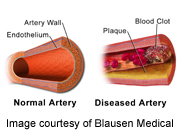
TUESDAY, Nov. 18, 2014 (HealthDay News) — Early stage vascular disease may lead to impotence for men later in life, a new study says.
“Erectile function can be a window into men’s cardiovascular and overall health. Erectile dysfunction and cardiovascular disease commonly coexist,” lead author David Feldman, a research assistant at Johns Hopkins University’s Center for the Prevention of Heart Disease, said in an American Heart Association news release.
The study, to be presented Tuesday at the American Heart Association annual meeting in Chicago, included more than 1,800 men without heart disease who were tracked for more than nine years.
“We looked at which measurement of early vascular disease was the best predictor for erectile dysfunction. We also looked at whether those men with multiple abnormalities, such as increased plaque in addition to arterial stiffness and dysfunction, were more likely to also suffer from erectile dysfunction,” Feldman said.
The men who had higher amounts of calcified plaque in their heart arteries were much more likely to later develop erectile dysfunction than those with no such plaque.
A number of other measures of early vascular disease were also associated with later development of erectile dysfunction, including higher levels of plaque build-up in the neck arteries that supply blood to the head and brain.
After factoring in age, race, sex and traditional risk factors such as diabetes, smoking, high cholesterol and obesity, the researchers concluded that men with higher levels of artery plaque and stiffness were 53 percent more likely to later develop erectile dysfunction.
While researchers found a link between vascular disease and later erectile dysfunction, it did not prove cause-and-effect.
Men at risk for vascular disease and erectile dysfunction should eat a heart-healthy diet, get regular exercise and avoid smoking, Feldman said.
Findings presented at scientific meetings should be considered preliminary until they are published in a peer-reviewed journal.
More information
The U.S. National Library of Medicine has more about vascular diseases.
Copyright © 2026 HealthDay. All rights reserved.

